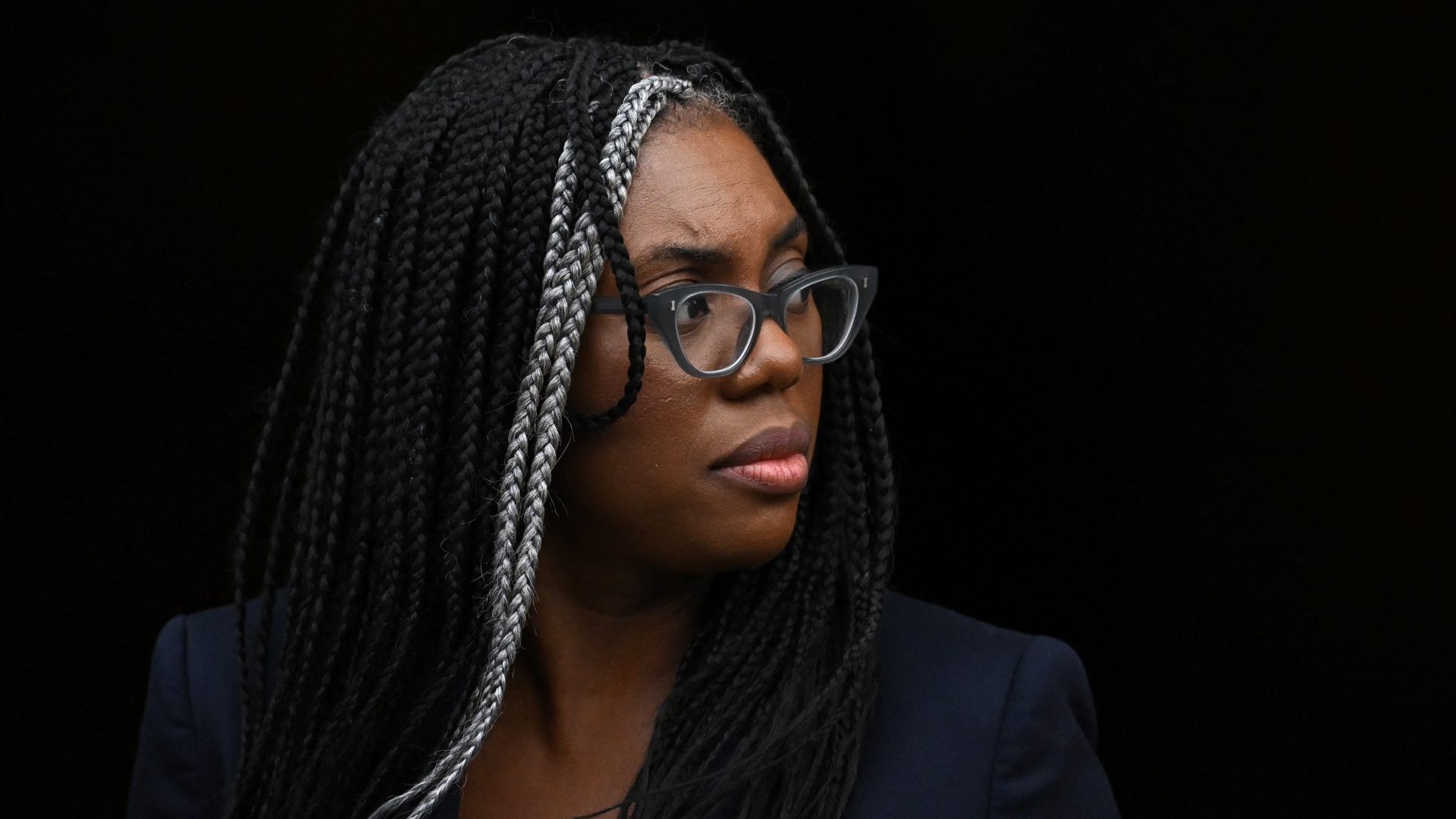Who is Kemi Badenoch, the woman poised to become the next Conservative Party leader? There are a number of ways to answer that question.
Badenoch was elected in 2017 as MP for Saffron Walden, and is the secretary of state for business and trade, as well as the minister for women and equalities. She previously served as minister of state for local government, faith and communities, exchequer secretary to the Treasury, and parliamentary under-secretary of state for children and families. Before that, she was a London Assembly member. She supported Brexit in the 2016 referendum. That is one way to answer the question.
Another one would be to say that she is 44 years old and was born in London but spent most of her childhood in Lagos, Nigeria. Her mother was a university professor and her father a GP. She moved to London at 16, alone, and worked at McDonald’s in order to put herself through college.
After graduating from university, she worked as a software engineer, then a systems analyst. In 2006, she joined the private bank Coutts & Co as an associate director; in 2015, she became digital director of the Spectator. She is married to Hamish Badenoch, a former Conservative councillor who works for Deutsche Bank. They have two young children.
That is another way to go about it, but it doesn’t quite get to the heart of the matter, does it? Let’s try again.
Who is Kemi Badenoch, the Conservative MP other Conservative MPs have resentfully started being nice to because whoever is left over after the next election may well have to grovel to her to get a shadow cabinet job? You just have to ask – she’ll tell you.
“I believe in free markets and free trade. But there is more to conservatism than economic liberalism – there is respect for the rule of law; personal responsibility; freedom of speech and of association; and opportunity through meritocracy,” she said in her maiden Commons speech in July 2017. “Those freedoms are being subtly eroded in an era when emotion and feeling are prized above reason and logic.”
Later that year, she was interviewed by Conservative Home and asked to define herself politically. “I’m not really left-leaning on anything,” she said. “I always lean right instinctively.” As time went on, she added, she found herself “becoming less socially liberal than I was… It feels like all the big battles have been won, and I don’t know what it means now”.
Many politicians could be criticised for their unwillingness to define themselves, especially as they attempt to climb the greasy pole. Badenoch isn’t one of them, and never has been.
Back in 2010, long before she entered parliament, she met the journalist Janice Turner at an event about female Tory candidates. “To the question, ‘What was the last issue that made you shout at the TV?’, replies ranged from unaffordable childcare to NHS red tape,” Turner recalled in the Times recently. Badenoch’s answer? “I hate identity politics”. Few MPs can claim to have always been this ideologically consistent.
This may be why she was able to hit the ground running once finally elected. In December 2017, Politico’s Playbook newsletter dubbed her “newcomer of the year”. “Every new intake seems to have an MP who catches the eye within weeks of arriving, and in 2017 it was Badenoch,” they wrote. “You don’t have to be Mystic Meg to see she is going places, and fast.”
They weren’t the only ones keeping an eye on her back then. Earlier that month, Rupert Murdoch had organised a small Christmas bash at his penthouse in central London. Badenoch was one of the few parliamentarians on the guest list.
Five years later, she launched her leadership campaign by calling for “free markets, limited government, a strong nation state. Those are the conservative principles we need to beat back protectionism, populism and polarisation, and to prepare us for the challenges ahead”. No surprises there. In the end, she came fourth – not a bad outing for an MP who had never been in cabinet.
As things stand, her next attempt is likely to be more successful. For a start, Badenoch has now become the darling of Tory members. She was picked as their most popular cabinet minister in ConHome’s last survey – and the one before that. And the one before that. Her predecessor in the top spot, James Cleverly, is now too busy drowning in the quagmire that is the Home Office.
Every event she appeared at during last year’s party conference was oversubscribed, and every newspaper in the land has now turned its attention to her. The Westminster bubble has seemingly made up its mind: Badenoch will be the next Conservative leader. The next question, then, should be an obvious one: will she be any good?
“There’s a very specific skill set required to be the first leader after a heavy election defeat,” said Dr Nigel Fletcher, academic and co-founder of the Centre for Opposition Studies. “You have to be someone who has got the personal resilience to be able to cope with it, because it’s a really miserable job. William Hague described it as doing the night shift.”
This is something currently missing from the debate. In 2022, when Badenoch put herself in front of her peers and party members, she was auditioning to become prime minister. She did a decent enough job, but that doesn’t mean that she is necessarily cut out to be leader of the opposition. It is a very different gig, with very different requirements.
“It’s a really particular task. It has to be somebody who can focus more on the organisational part of the job because the party will be in a pretty fractious state, you will have different factions warring among themselves. You need a bit of HR and diplomacy,” Fletcher explained. “In that first term of opposition, there’s a lot of work to be done, firstly on party management and just steadying the ship, and that requires some personal qualities.”
It isn’t clear that Badenoch has them. Speak to Conservatives in Westminster and few will describe her as diplomatic – as most recently witnessed by her furious reaction to comments made by former Post Office chair Henry Staunton – or even especially friendly. She is, an ally of hers told the New Statesman recently, “not the sort of person to go into the Commons tea rooms and charm people”, which makes you wonder what an enemy would have said.
Prime ministers don’t always need to be clubbable, as the promise of government jobs helps keep MPs in check. If the only thing you can offer a potentially wavering colleague is a minor job in a shadow cabinet team, your interpersonal skills will suddenly become more important.
Similarly, Badenoch is currently famous for her obvious dislike of journalists. She rarely agrees to speak to the press and has been known for getting into unnecessary spats with reporters from critical outlets – despite being seen as Murdoch’s choice for next Tory leader, she is currently embroiled in a row with his Sunday Times and “the journalist who chose to ignore the facts” because the paper dared to print Staunton’s claims even after she had denied them.
Most famously, she once Tweeted that a journalist was “creepy and bizarre”, after that journalist had the temerity to send her office a request for comment. Again, this is behaviour a secretary of state can get away with: there is a power balance that falls in their favour. Journalists will always be keen to hear from senior ministers, even if they aren’t especially pleasant. That changes when those MPs end up in opposition.
“As leader of the opposition, you’ve got all of the expectations and pressures of being a national political figure, but with none of the advantages,” Fletcher said. “You’ve got the expectation that you’re going to be ready to immediately respond to every issue under the sun.
“You’ve got a growing expectation, as you move through parliament, that you’re going to have policy solutions to all the challenges that are being faced, but you don’t have any of the advantages either of public goodwill, which a new government tends to start with at least, or access to media. People are not generally interested in what the opposition has to say.”
In practice, being an effective leader of the opposition means getting attention from Fleet Street even when Fleet Street would rather be talking to the people actually running the country. It’s a dynamic Badenoch has never experienced, and she may not find it to be within her comfort zone.
Then there is the thick skin one should ideally have to do the job well. “Although William Hague wasn’t seen at the time as being a particularly effective or credible leader to take the party back to power, history can be a bit fairer to him in saying that he at least had the personal qualities that were necessary”, Fletcher added. “He was quite unflappable”.
Badenoch can be described as many things, but unflappable probably isn’t one of them, as can be seen by her long Twitter rant accusing Staunton of giving “an interview full of lies”. She then doubled down in the Commons, calling his claims a “disgrace” and motivated by “revenge”.
Of course, a politician ought to be able to respond to a story in which they are mentioned, but whether this was the right way to do it is questionable. Last weekend, Badenoch could also be found attacking the actor Michael Sheen’s views over Tata Steel’s redundancies in Port Talbot – no doubt this stuff goes down well with Tory members, but is she a calm leader or simply someone attracted by conflict?
Still, there is one silver lining in all this, hiding in plain sight. The politician assumed to be the next Conservative leader is a Black woman, and barely anyone is talking about it.
“I don’t think it will be seen as particularly significant to have the first Black party leader, because the scale and pace of ethnic diversity at the top of politics since 2015 has been so rapid and so great,” said Sunder Katwala, the director of the think tank British Future. “For it to have become so normal is worth mentioning.”
Elsewhere, there is relatively little to be optimistic about for her supporters. It looks as if Labour will win the next election by a landslide. Many Tory big beasts are standing down. Others will lose. The parliamentary party will be full of newcomers, largely stripped of anyone with experience of opposition.
Even if Badenoch does win the leadership contest, it will be just the beginning of a long and bruising battle, leading to a final question: why now? Shouldn’t she wait for someone else to fail first? According to Fletcher, “You’ve got to take the chance when you get it. No politician, when they’re given the opportunity to lead their party, is going to say, ‘well, it’s not the right time for me’.”
There is a world in which Badenoch could competently lead the Tories. She has convictions, is a shrewd political player, and her story is compelling. In Westminster, as in love, however, nothing really matters if the timing isn’t right. Can an MP with little interest in her colleagues and the press lead her party back from electoral oblivion? Stranger things have happened, but this may be a stretch, even for British politics.




